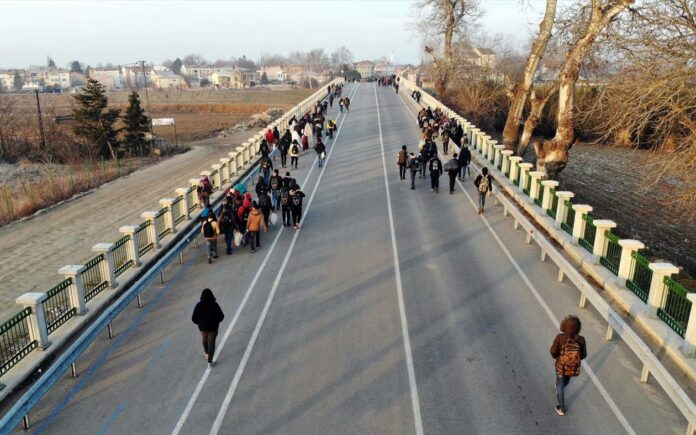Balkan countries are reportedly also preparing and planning to deal with any new migrant crisis, one reminiscent of 2015, as the Turkish government has officially “opened its borders” to third country nationals attempting to reach the European Union in an irregular manner – with thousands of would-be migrants to Europe quickly gathering at a border post on the Greek-Turkish frontier in a bid to enter the country.
The result was a rapid mobilization of Greek security forces, including military units, along the land border with Turkey in the Thrace province, and especially at the Kastanies border post, as well as along the sea borders in the eastern Aegean, which were essentially opened back in 2015 by the then Tsipras government.
On Tuesday Greek Prime Minister Kyriakos Mitsotakis will accompany both the president of the EU Commission, Ursula Gertrud von der Leyen, EU Council President Charles Michel, and European Parliament President David Sassoli to the border along the Evros River, along with other EU officials.
To the immediate north, Bulgarian Prime Minister Boyko Borisov called on the EU to do “whatever necessary” to give Erdogan-led Turkey more EU funds in order to keep migrants and asylum seekers within Turkish borders.
In Croatia, interior minister Davor Bozinovic said the country is ready to deal with another migrant crisis, while adding that diplomacy is the foremost solution.
In Belgrade, foreign minister Ivica Dasic promised that Serbia will deal with migrants “fairly”, while at the same time warning that they cannot be “trapped” in Serbia for a lengthy period.
At the focal point of the latest crisis, the Kastanies border post, Greek authorities reported that more than 24,000 people were prevented from illegally entering Greek territory, while 183 arrests were made.
The territory in question is essentially a small land “bulge” that extends west of the Evros (Meric) River, and across from the historic city of Edirne. The specific border post is called Kastanies, taking its name from a nearby village on the Greek side of the frontier. The “bulge” on the west bank of the Evros was a concession to new Republic of Turkey ahead of the 1923 Lausanne Treaty, whereby the city of Edirne (ancient and medieval Adrianople) would not be located exactly on the border.
In related developments, the UN’s High Commission called the Greek government’s decision not to accept asylum requests by people entering Greek territory – instead of filing applications in Turkey at third countries’ diplomatic missions – as lacking a legal basis.
In reply, the Mitsotakis government said Greece is facing a sudden, mass and rising movement of third country nationals assembling at the country’s eastern borders, and as a result has a
In a related development, Mitsotakis spoke by phone with US President Donald Trump on Sunday evening, with the former underlining that Greece has the inalienable right to defend its borders.
According to Greek government sources afterwards, the US president recognized Greece’s right to impose the rule of law on its borders.
Finally, a government spokesman again rejected Turkish government claims that live rounds were fired at people breaking through the border fences, and allegations that two men were shot dead.
Conversely, one child, a five-year-old boy, was drowned in the eastern Aegean, a tragic incident also reminiscent of 2015.
According to reports on the specific incident, a group of would-be migrants on a flimsy inflatable were accompanied by a Turkish coast guard patrol boat to the spot where Greek territorial waters begin. Afterwards, the craft was sunk and assistance requested from the Greek coast guard, in a bid to have the latter rescue the group and take them to Greek/EU territory.














